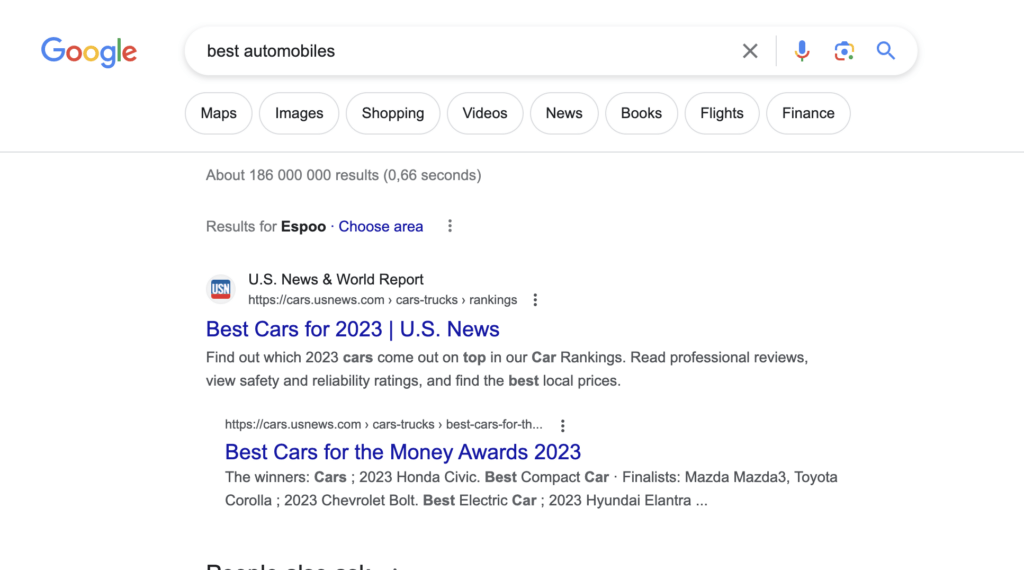My blogs and websites have been read by 6M+ people in the past 2 years. Yet, I’ve never thought about keywords or implemented any other shady SEO strategies.
Overall, I don’t want to try to cheat Google’s algorithm—it simply doesn’t work.
All I do is try to help my visitors and make the internet a better place.
Today, I will tell you why keywords don’t matter and why you should never think about keywords when blogging.
Also, I will show you what truly moves the needle when building websites that get tons of visitors from Google.
Keyword Oriented SEO Is Just Wrong
Let’s be real. Building successful blogs and websites is not a science.
It’s all about solving a problem for a target group or niche.
If there was an equation for appearing high on search results, people could easily use it to modify the search results.
This would lead to fake experts and SEO gurus taking over the internet flooding it with non-informative content that only ranks because they “cracked the code.”

This would render the search results useless. Search engines would be full of information that isn’t accurate and not backed up by facts or expertise.
But sadly, this is how search engines used to work back in the day. If you wanted to rank high for something like “pizza recipe”, you’d just need to repeat that word as many times as possible on your website.
But gone are those days when it was all about keywords.
These days, search engines use much more sophisticated algorithms to show search results. The AI that powers the search engines can read web pages more and more like humans and less like bots.
This means SEO growth hacks are becoming less and less effective.
These days, it’s all about providing value.
To succeed in search results, a website needs to solve a problem and show expertise in a particular niche. Building successful websites like blogs is no longer a technical affair—and I love it!
Keywords Will Only Do Harm
Google is good at detecting keyword stuffing—the act of placing keywords only to please the search algorithm.

As search engines evolve, they are better and better at understanding web pages.
A website owner no longer needs to tell search engines what the content, such as a blog post, is about.
Google already knows.
This hasn’t always been the case, though. It’s why some people still sell those expensive SEO tools and keyword strategies. They simply believe those still work.
Years ago, the issue was that search engines couldn’t tell if two things with different names meant the same thing.t
For instance, consider these words: “automobile” and “car.”
Both words refer to the same type of vehicle, a four-wheeled motor vehicle used for transportation.
But search engines didn’t really understand that these words refer to the same thing.
This led to inconsistencies in search results.
For example, you might have gotten different search results for “best automobiles” than “best cars”—even though the search intent is exactly the same.
But these days, search engines understand natural language and recognize synonymous terms.

Thus, you don’t need to worry about keywords in your blog posts. Google will 100% understand your content and find the right audience for it.
All you need to do is write content that’s actually readable, digestible, and informative and that provides value.
A Worrisome Trend
Recently, since the release of ChatGPT and other AI-powered writing tools, it feels like the buzz around keyword placements and strategies has resurfaced.

There are tons of BS guides that show how to use AI to create effective keyword strategies to rank high on search results. It seems many people AI like a god that knows how the Google ranking algorithm works.
But in reality, the AI tools just repeat the patterns that fishy black-hat SEO guides taught back in the day.
If one could use AI to whip up a blog post that would rank high on search results, the internet would once again be flooded with AI-autogenerated misinformation.
The reality is that AI tools don’t know how to make a website rank. Heck, AI cannot even think or know whether it’s right or wrong.
These days, creating websites is more than just writing blog posts or placing keywords.
It’s about combining experience, expertise, and knowledge in an illustrative, informative, and actionable way.
A post or page that doesn’t “add to the internet” won’t cut it.
AI is only capable of repeating stuff it has seen in the training data. It can surely use keywords and lay them down in a strategic way.
But this is not what makes websites rank high.
It’s the expertise, usefulness, and relevancy that truly matter. Everything else comes naturally.
SEO Is No Longer a Science
One thing I must point out is that I’ve seen lots of SEO gurus act like those cool scientists that have cracked the Google code with heavy maths, research, and clever thinking.
But in my opinion, these guides will only make a simple, non-technical task sound complicated and technical.
Surely, back in the day, SEO was about using expensive tools, acquiring backlinks, and placing keywords.
But these days, none of that matters. A website that ranks high on Google is the one that Google trusts the most.
Before ranking a website, Google needs to be sure that the website is created people-first. The website needs to be a truly relevant and trustworthy resource.
In simpler terms, a website should solve problems better than anyone else on the internet.
So for example, if it’s an online tennis business, there needs to be hundreds and hundreds of tennis-related blog posts that cover tennis from A to Z.

SEO, ironically, is no longer about pleasing the search engine algorithm. As a matter of fact, “SEO optimal” content ignores search engines altogether.
The goal is to write for humans, not for robots.
Search engines like Google can easily tell if a web page is created for people or just hacked together to make it rank high.
By doing “strategic keyword placement”, you only run the risk of being penalized by Google for trying to trick the system.
What If Keywords Mattered?
Imagine if the keyword strategies still worked and one could rank blog posts high on Google with strategic keyword placements.
With today’s automation technology, there would be website robots that would write millions and millions of posts every day.
This type of content would quickly take over the internet.
In a couple of months, the search results would be littered with useless content that doesn’t solve problems but only shows up because of those keywords.
Luckily, that’s not the world we live in!
Wrapping Up
And that’s a wrap for today. Remember, SEO is no longer about pleasing the search engines.
It’s all about being useful and solving problems with blog posts and websites.
To rank a website high, it needs to be the best resource for that niche in the world. In other words, it needs to cover absolutely everything in a better way than anyone else has ever done.
Thanks for reading. Happy writing!
